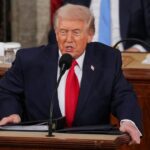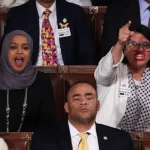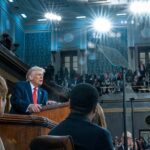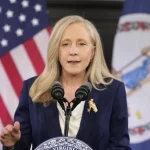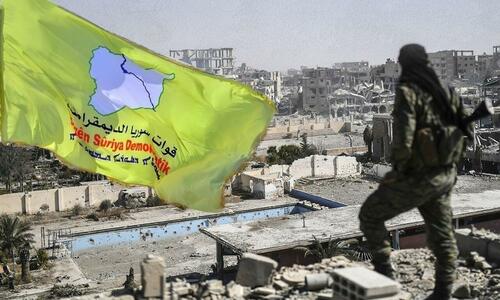
A Kurdish delegation representing the Syrian Democratic Forces (SDF) concluded a visit to Damascus on Friday after meeting with several representatives of the Syrian government over the prior few days, Lebanese newspaper Al-Akhbar reported.
The delegation was headed by the foreign relations chief of the Autonomous Administration of North and East Syria (AANES), Badran Jia Kurd, and arrived in the capital on January 17. According to the report, the last few meetings did not result in anything significant, but the "prevailing impression" is that both sides are willing to continue along the path of dialogue, despite US warnings.

"These are preliminary understandings between the two sides, on things such as Syrian territorial integrity, the national flag, and the presidency of Bashar al-Assad," it states.
It adds that Washington has repeatedly warned the SDF "not to engage in bilateral dialogue with the Syrian government [and not to] think of any military solutions with it," even if the reconciliation process fails. This is based on the "realization that any military solution [between the two] may turn into a war of a civil and ethnic nature," it adds, which could be referring to a potential outbreak of direct clashes between Turkish and Kurdish ground forces, or even Syrian and Turkish ground forces.
Nonetheless, sources have told the newspaper that the overall atmosphere of the visit to Damascus and the Kurdish-Syrian talks were "positive," particularly for the SDF, which reportedly appreciated Syria’s firm position not to go forward with reconciliation until there is a clear and official Turkish intent to withdraw its military forces from the country.
"There is a consensus between the two sides on the need to maintain the course of dialogue while searching for points of convergence to take advanced steps in the future," the sources were quoted to have said.
In the aftermath of the 18 January meeting between US Secretary of State Anthony Blinken and Turkish Foreign Minister Mevlut Cavusoglu, the SDF has expressed renewed fear over Turkey's long-promised ground offensive.
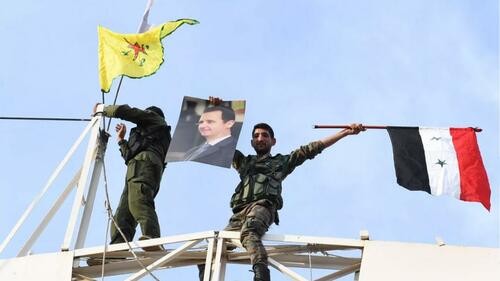
These fears were reinforced by the joint US-Turkish statement released shortly after the meeting, vowing the continuation of Washington and Ankara’s fight against "Daesh, PKK, Al Qaeda, and all other terrorist organizations and their extensions."
The Kurdish fears have also been exacerbated by the Turkish military bombardment and a significant escalation of tensions in Ain al-Arab and other areas across northern Syria, beginning on January 13 and persisting onwards. As a result, the SDF bombarded a Turkish base and the positions of Turkish-backed militants on January 20.
A Kurdish delegation representing the Syrian Democratic Forces (SDF) concluded a visit to Damascus on Friday after meeting with several representatives of the Syrian government over the prior few days, Lebanese newspaper Al-Akhbar reported.
The delegation was headed by the foreign relations chief of the Autonomous Administration of North and East Syria (AANES), Badran Jia Kurd, and arrived in the capital on January 17. According to the report, the last few meetings did not result in anything significant, but the “prevailing impression” is that both sides are willing to continue along the path of dialogue, despite US warnings.

“These are preliminary understandings between the two sides, on things such as Syrian territorial integrity, the national flag, and the presidency of Bashar al-Assad,” it states.
It adds that Washington has repeatedly warned the SDF “not to engage in bilateral dialogue with the Syrian government [and not to] think of any military solutions with it,” even if the reconciliation process fails. This is based on the “realization that any military solution [between the two] may turn into a war of a civil and ethnic nature,” it adds, which could be referring to a potential outbreak of direct clashes between Turkish and Kurdish ground forces, or even Syrian and Turkish ground forces.
Nonetheless, sources have told the newspaper that the overall atmosphere of the visit to Damascus and the Kurdish-Syrian talks were “positive,” particularly for the SDF, which reportedly appreciated Syria’s firm position not to go forward with reconciliation until there is a clear and official Turkish intent to withdraw its military forces from the country.
“There is a consensus between the two sides on the need to maintain the course of dialogue while searching for points of convergence to take advanced steps in the future,” the sources were quoted to have said.
In the aftermath of the 18 January meeting between US Secretary of State Anthony Blinken and Turkish Foreign Minister Mevlut Cavusoglu, the SDF has expressed renewed fear over Turkey’s long-promised ground offensive.

These fears were reinforced by the joint US-Turkish statement released shortly after the meeting, vowing the continuation of Washington and Ankara’s fight against “Daesh, PKK, Al Qaeda, and all other terrorist organizations and their extensions.”
The Kurdish fears have also been exacerbated by the Turkish military bombardment and a significant escalation of tensions in Ain al-Arab and other areas across northern Syria, beginning on January 13 and persisting onwards. As a result, the SDF bombarded a Turkish base and the positions of Turkish-backed militants on January 20.
Loading…


